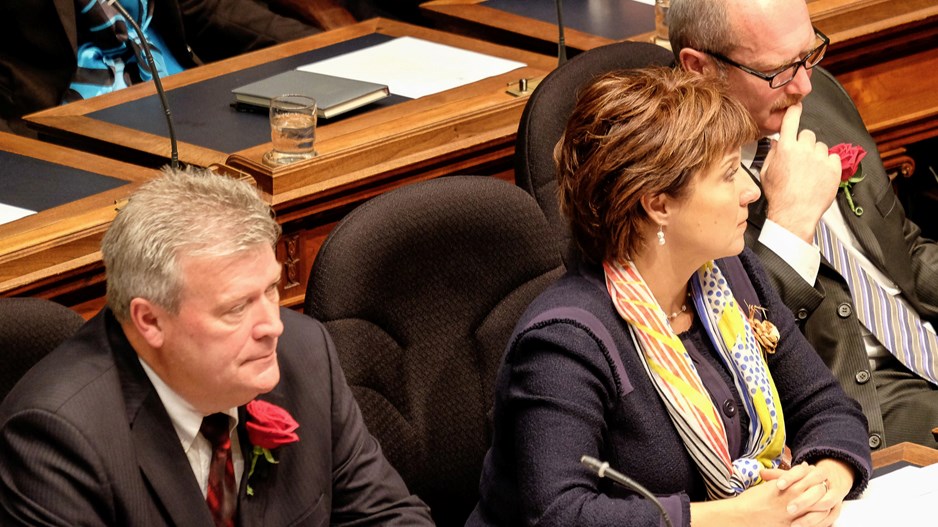The senior Mountie in charge of a B.C. money laundering unit in January 2011 says he was “taken aback” by then minister of public safety and solicitor general Rich Coleman’s dismissal of his assessment of money laundering activity in government-regulated casinos.
Before the B.C. Commission of Inquiry into Money Laundering, retired inspector Barry Baxter described Coleman’s well-publicized disagreement with the RCMP as not grounded in facts.
After CBC News published an RCMP-authorized interview with Baxter on January 4, 2011 – in which Baxter candidly outlined serious and evidence-based concerns of drug cash being washed through casinos – Coleman dismissed the claims to media.
Baxter told the inquiry about what happened after.
He said he received an “unusual” call from his senior officer and then E-Division Deputy Commissioner Craig Callens, who told Baxter to “know your audience.”
Then, he said, “We discussed the CBC interview and I explained our investigative approach and offered to provide a thorough in-depth briefing … but he declined.”
Coleman, himself a former Mountie, had told media that Baxter’s superiors disagreed with Baxter.
“I was taken aback that [Coleman] would report superiors of mine did not agree with me and my position that this was money laundering,” said Baxter, adding no superiors told him otherwise.
Coleman is expected to testify this month, as is former premier Christy Clark and other past ministers in charge of the gambling file.
Baxter was in charge of the B.C. unit of the Integrated Proceeds of Crime (IPOC) unit, which appeared to take over illegal gambling files after Coleman authorized the disbanding of the Illegal Gaming Enforcement Team (IGET) in 2010. Coleman has also told media the RCMP told him IGET was inefficient.
Baxter said he came to IPOC in 2010 and started receiving intelligence from the Gaming Policy and Enforcement Branch (GPEB) on a roster of Chinese gamblers coming into the casino with hundreds of thousands of dollars worth of $20 bills in bags.
“To me, [that] was classic money laundering in the heading of placement,” he said, adding that drug-detecting dogs found drug residue on all the money he tested.
Baxter corroborated past testimony from GPEB investigators who felt their authority had been undermined by suspected government indifference.
“My impression was they felt they weren’t getting the support higher up, either with the ministry higher up or the lottery corporation,” said Baxter.
The B.C. Lottery Corp. (BCLC) also took issue with Baxter’s assessment.
“They didn’t agree – that was the standard response, despite the good discussion –
and neither does the minister,” said Baxter, adding the “veracity” of information coming from GPEB and BCLC was inadequate.
Baxter’s assertion runs contrary to claims by the BCLC, which has said it never had adequate proof from police the money was proceeds of crime.
Regardless of Coleman’s comments, IPOC continued investigating B.C. casino activity until its disbandment in 2012, when RCMP shuffled units in a cost-cutting exercise.
“Right up until the time I left, there was not an acceptance at BCLC that what was occurring was money laundering,” said Baxter, who was moved to the Federal Serious and Organized Crime (FSOC) unit in January 2013.
At that point, he told the commission, it was his opinion the RCMP was failing to meet its international obligations to combat financial crime.
Baxter understood what was happening in B.C. casinos involved transnational organized crime from China, Mexico and Iran working with local gangs. The triads would take local drug cash and lend it to Chinese gamblers, who would repay the loans via underground banks in China or, in some instances, with local real estate.
But Baxter said casino money laundering “scored lower” than terrorism and matters considered of national interest.
The RCMP’s alleged poor response to money laundering has provided a shield to BCLC and GPEB, two regulatory agencies that have butted heads during the inquiry.
Cullen heard earlier in the week from the province’s top policing officials about gaps in law enforcement of financial crimes.
“While the RCMP is attempting to adapt to those gaps, it has been inefficient,” to date, said Assistant Deputy Minister and Director of Police Services Wayne Rideout, who is a former Mountie.
The inquiry learned the RCMP Joint Illegal Gaming Investigation Team (JIGIT) has processed just one money laundering charge since 2016.
The inquiry’s mandate is provincial in nature and so does not have full access to federal government entities such as the RCMP. Also, police cannot speak to specifics of any investigation. Rather, the inquiry’s mandate is on provincial regulations, including gambling, auto sales and real estate, and those in charge of them.



